The story of Ikaw Ako, a specified non-profit organization, strengthening its organizational base
"Ikaw Ako," headquartered in Nagoya, is working on a regional revitalization focusing on mangrove regeneration in the Philippines. We got them to look back on two years of efforts to strengthen its organizational base by addressing issues such as the organizational structure, financial resource makeup, and the lack of involvement of domestic donors.
[Reedited the contents of issue 407 of THE BIG ISSUE JAPAN Japanese edition (published on May 15, 2021)]
10,000 people a Year Visiting Mangrove Forests
The Makeup of Financial Resources Being Dependent on Grants Is an Issue
Ikaw Ako is a Filipino word for "you and me." Goto Yorihisa, chairman of the board of directors, describes the start of that activity as follows.
"A man who was stationed as a Japanese soldier on the island of Negros in the Philippines during World War II, had been supporting second and third generation descendants of Japanese left in the Philippines after the war. The origin of Ikaw Ako is that we started planting mangroves there in 1997 to see if there was anything we could do to carry on his ideas."
The mangrove forests in the Philippines have been cut down for urban development and conversion to aquaculture ponds, etc., and have been decreasing since the 1970s. "Coastal residents have become more exposed to the effects of high waves, and wetland creatures such as shrimp and crabs have lost their habitat, reducing the catch amounts of coastal fishing."
The NPO is now extending its activities on the islands of Negros and Bohol.
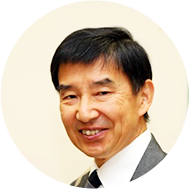
Yorihisa Goto,
President of NPO Ikaw Ako
"On Negros, the construction of bamboo bridges through the regenerated mangrove forests has led to 10,000 people from the Philippines and abroad visiting them for tree planting and ecotourism, and nine seafood restaurants being built. These activities have been praised and received an award from the Philippine Department of Tourism. We have organized homestays for students on school trips from Japan, and also held study tours going around the city with local high school students. Even in mountainous areas, we are promoting "agroforestry” i.e. growing crops for living at the same time as we regenerate the forests."
On the other hand, they have also felt that there is an issue with the organization's management in terms of "the makeup of financial resources being dependent on grants and subsidies." Starting from the idea that they "would like to increase the proportion of Ikaw Ako led projects and donations, and establish an organizational structure that will allow a generational shift with the next representative," Mr. Goto applied for the "Panasonic NPO/NGO Support Fund for SDGs" at the time of his early retirement from the university where he worked, and for two years from 2019, he worked to strengthen the organizational base.
"We asked the Nagoya NGO Center for organizational support, and decided to set up an office within that center for them to give us advice while watching our daily activities."
Effort to Involve Citizens in the Medium-Term Vision
Strengthening the Secretariat and Building a Membership Management System
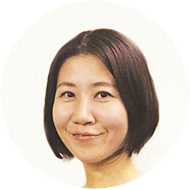
Yoko Kimura,
staff member, NPO Ikaw Ako
First of all, 10 or so core members discussed the problems and decided on a future direction. In response to the opinion expressed therein that they would like to renew their management, which tended to be more and more rigid, and involve citizens, carrying out activities that make use of that wisdom and strength, they formulated a medium-term plan.
"To make it easier for anyone seeing it to understand, we created a chart based on four core businesses. We have also posted three-year targets and evaluation indicators, and by carrying out activities while checking the chart, the PDCA (Plan-Do-Check-Act) cycle will move forward, creating a system that shows the degree of achievement and where we stand at the moment."
In addition, in order to strengthen the secretariat structure, the working environment was developed and one staff member was hired. "Up until then, the other Japanese staff besides myself was only one project manager who was assigned to the project site, and I was the only one working as an assistant for the project and in the secretariat," Mr. Goto recalls.
The person who was hired, Ms. Yoko Kimura, became interested in Ikaw Ako’s activities because her instructor in the online English conversation course she was attending was from Negros in the Philippines.
"Through this grant, we were accepted as interns by Voluntary Neighbors, an intermediate support organization for NPOs and community development, and we learned a lot such as how to build an organizational base and how to make the board of directors function amongst others. Immediately after the internship had started, we held a board meeting to invigorate communication. The number of people involved in activities has increased."
They also participated in training for NPOs sponsored by Nagoya City. "Referring to flyers from other organizations, we drew up a vision sheet for citizens that captures the essence of the medium-term plan. We devised a way to make it look interesting because if you fold the sheet up or down, it will become a pocket-sized sheet."
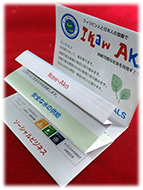
Vision sheets for distribution
They also worked on building a membership management system.
"This is a system that allows you to distribute an e-mail magazine to people who have a connection with us through crowdfunding or donations, and collect membership fees all at once. In the future, I would like to think of a system that allows members to check the status of each other's activities by linking it with social media."
What They Want to Work on after the Coronavirus Pandemic Abates:
Local Training and River Basin Resource Maps
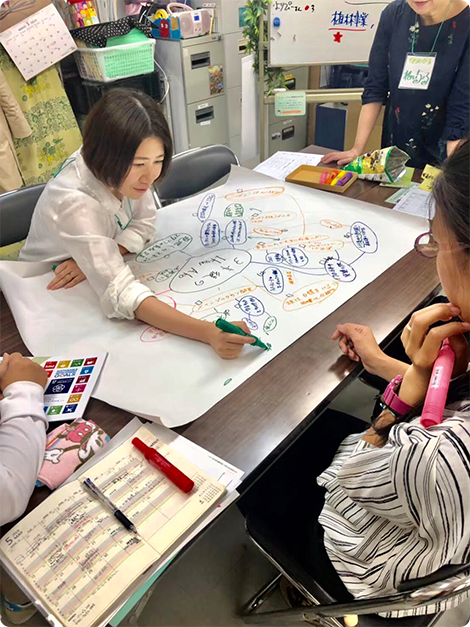
The mid-term vision creation workshop
In addition, in order to increase the proportion of Ikaw Ako led projects, the local training that until now had accepted mainly students on long vacations has also been extended to companies.
"In 2019, we conducted a pilot employee training program at a certain company that included such activities as active learning (*) on the theme of SDGs and mangrove planting and we heard that the program was very popular, with more than ten times the set number of participants applying from within the company. We plan to restart once the coronavirus pandemic has abated, and are continuing to approach other companies and travel agencies," says Mr. Goto.
In addition, in order to diversify the sources of funding, they made a list of information about overseas grants. One of those approaches was a failed attempt, but even so, Mr. Goto says that they will continue to look for funding on the basis of the list.
In 2020, the situation in society changed greatly due to the coronavirus pandemic. "The Japanese staff who was stationed in the Philippines returned to Japan, and we had to reduce the number of staff in the Philippines from 10 to 5. 'Organic Cafe MIDORI,' which was run locally, also closed."
Since they cannot go there now, they try to absorb what they can learn from the activities of domestic NPOs, and they held a three-day and two-night workshop together with "NPO Sento Tarui," which is working on environmental problems and activities to revitalize the local area in the Ibi River basin in Gifu Prefecture. "I thought that creating resource maps for river basins and organically linking human and material resources could also be applied in the Philippines."
The medium-term plan, which was established in the first year of the grant, also had to be changed, but "Since the plan was in a tabular format, we were able to correct the trajectory immediately. I want to apply what I have learned over the past two years about strengthening the organizational base to our office in the Philippines, and since we have also received approval as an NPO in the Philippines, I would like to support them so that they can eventually become independent," says Mr. Goto positively.
The Philippines recorded an annual economic growth rate of more than 6% until the coronavirus pandemic, and its per capita GDP exceeded $3,000.
"If you look at the urban areas of the Philippines, you can clearly see its development: the shopping malls appearing, and the increase in traffic. However, it is hard to say that the benefits have spread far enough to rural areas where income is scarce, and the gap seems to be widening. By developing ecotourism, we hope to create jobs and revitalize local communities while preserving the environment."
* A method of teaching and learning that is designed to encourage learners to learn actively instead of passively.
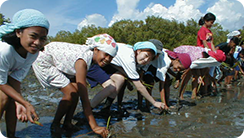
[Organization Profile]
NPO Ikaw Ako
In 1997, it started its activities as a voluntary organization based in the city of Silay in the province of Negros Occidental in the Philippines. Japanese and Filipinos work together across borders on environmental protection activities. It also provides job training and income support to help local residents raise funds to continue their activities.


